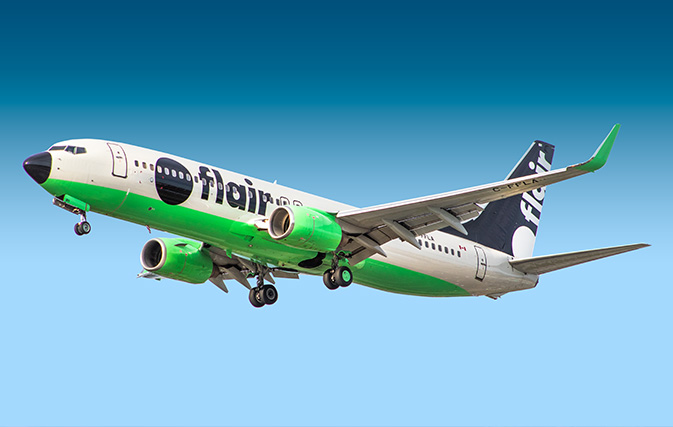TORONTO — Airlines including Air Canada, WestJet and Air Transat are speaking out against Flair Airlines’ request for an 18-month exemption to Canadian ownership requirements under the Canada Transportation Act.
Addressing the situation via a joint statement from the National Airlines Council of Canada (NACC), which includes the three carriers as members, and the Air Transport Association of Canada (ATAC), the airlines and other sectors of Canada’s aviation industry voiced their strong opposition to Flair’s request.
“It is entirely reasonable for Canadians to expect companies to comply with the clear and longstanding rules of the Canada Transportation Act,” says the statement, issued yesterday by the NACC’s Interim President and CEO, Suzanne Acton-Gervais, and John McKenna, President and CEO of ATAC.
“It is with this basic principle in mind that Canada’s airlines are calling on the Government of Canada to reject Flair Airlines’ request for an exemption under the Act.”
Questions surrounding Flair’s ownership have been swirling for months, and have received consumer media coverage in recent days and weeks, to the point that Flair posted this message on its Twitter account on April 14: “We’ve read the news, and the comments and we understand the sentiment caused by the media. We are a Canadian airline that will be here for years to come. Committed to our purpose: Value travel for Canadians.”
Various media outlets including the Globe and Mail and Global News have reported on the Canadian Transportation Agency’s March 3 preliminary review of Flair, which noted that Flair may not meet Canada’s requirements for Canadian ownership. Flair could lose its license to operate in Canada as early as May 3. Flair says it is working with the CTA to address the ownership issues, and has asked for the 18-month exemption.
As reported yesterday, there is now less than two weeks to go before the May 3 deadline.
Foreign ownership in Canadian airlines can’t be higher than 49%. That percentage drops to 25% if the foreign investment is from one individual. There are also rules around foreign interests controlling a Canadian carrier. 777 Partners, based in Miami, owns 25% of Flair, plus has three of the five seats on its board, and leases a number of aircraft to Flair.
In a recent interview with Vancouver media, Flair’s President Stephen Jones said: “I want to be really clear. We will not be grounded as a consequence of this review. This is an administrative process that we have a lot of influence over the outcome because we are going to listen to what the concerns are and we’ll deal with them.”
Jones also said travellers should be confident booking flights on Flair. The airline’s site greets visitors with this message: “We’re here to stay, so you can go.”
Flair, along with Canada’s other ultra low-cost carriers, new entrants and legacy airlines, is set to battle it out for market share this summer as the industry looks to maximize all the pent-up demand after two years of the pandemic.
The joint statement from the NACC and ATAC says the competitiveness and stability of Canada’s aviation industry “relies on a number of factors – chief among them, the application of statutes and regulations that give Canadian travellers confidence they are receiving service from domestic carriers that have demonstrably proven their Canadian ownership and investment.”
If Flair was to get its requested 18-month exemption, “this unprecedented request would allow Flair to continue operating outside the bounds of existing Canadian law, setting a troubling precedent while also threatening consumer confidence in the sector, at a time when the travel industry is working hard to provide a strong and sustainable future for air travel for Canadians,” say the NACC and ATAC.
“By failing to comply with basic, longstanding Canadian ownership and control rules, Flair places considerable uncertainty on the shoulders of travellers, potentially leaving them stranded without a backstop should Flair fail to abide by Canadian ownership and control requirements, as ordered by the Canadian Transportation Agency.
“Domestic control and ownership is not just a ‘nice to have’, it is a necessary underpinning of the system, and should be defended. It ensures that there is fundamental fairness and protects against one diluted or foreign owned business causing harm to the competitiveness of the whole industry.
“At a time when traveller confidence is reviving, and the entire tourism industry is edging toward the beginnings of a post-COVID recovery, it is in the public interest for the Minister of Transport to dismiss this exemption request and require Flair to meet their statutory obligations as prescribed by the Canadian Transportation Agency.
“Allowing Flair’s continued operation outside of longstanding, clear laws would set a dangerous precedent for those in aviation, business, and most importantly, Canadian consumers. The Government of Canada has an obligation to protect Canadians and uphold its own laws, and the best way it can do this is by ensuring all carriers comply with the applicable statutory obligations.”
NACC and ATAC add that their member airlines “stand ready to work with the Minister of Transport to mitigate the impacts on travellers and workers, including by offering alternatives and options as a result of the Canadian Transportation Agency’s investigation into Flair, or the Government of Canada’s denial of this exemption request. We commit to working with the government to ensure that the public interest remains top of mind for law-abiding air carriers.”

